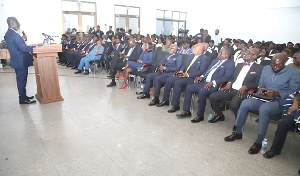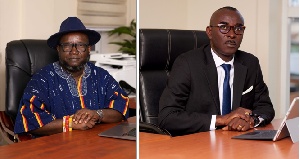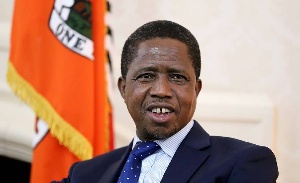Business News of Tuesday, 22 April 2025
Source: www.ghanawebbers.com
Incorporate ECOWAS law into legal education - Justice Asante urges
Justice Asante emphasized the importance of engaging law students. They will become future attorneys-general, ministers of justice, and human rights lawyers.
He urged the ECOWAS Court to collaborate with law schools in member states. This collaboration should include courses on ECOWAS Law and the court's mandate.
During a public lecture at the University of Professional Studies, Accra (UPSA), he discussed building a community court that serves citizens. He praised UPSA, the University of Ghana, and KNUST for including ECOWAS Law in their curricula.
Justice Asante hopes these efforts inspire other institutions in the region. He announced plans for an ECOWAS Community Law Moot Court competition later this year. This competition will involve selected law faculties and expand to all member-state law schools in future years.
The moot court aims to deepen students' knowledge of ECOWAS Law. It will also enhance their legal research and advocacy skills.
Justice Asante proposed reforms to strengthen the court's operations. A major challenge is weak enforcement of judgments under Article 24 of the Protocol.
He suggested amending Article 24 to allow judgment creditors to seek enforcement through national courts. Individuals should also be able to request judicial sanctions against non-compliant states.
“It is essential that Article 24 be revised,” he stressed. The current system undermines the court's authority and citizens' confidence in seeking redress.
He noted that while there is an ECOWAS Supplementary Act on Sanctions, it limits implementation to political organs only. Individuals cannot trigger sanctions, which is another gap needing attention.
Justice Asante encouraged broader engagement beyond national capitals. He suggested outreach events and legal training for grassroots actors and vulnerable communities.
He called on national authorities to fulfill obligations under ECOWAS Protocols. By 2024, only Liberia and Sierra Leone had ratified both key protocols, which he found alarming.
He urged bar associations and legal practitioners to understand the court’s jurisdiction better. The court’s rulings are crucial for democratic governance and human rights norms in the region.
Digital transformation is vital for improving access to justice, according to Justice Asante. Under his leadership, an Electronic Case Management System (ECMS) will launch by April 2025.
This system allows electronic filing and management of cases in English, French, and Portuguese. His modernization efforts aim to remove barriers like physical distance and costs for citizens seeking justice.
The public lecture was organized by UPSA Law School. It was attended by notable figures including Foreign Affairs Minister Samuel Okudzeto Ablakwa and several justices from the Supreme Court.











